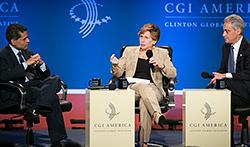The Real Retirement Crisis
America has a retirement crisis, but it’s not what some people want you to believe it is. It’s not the defined benefit pension plans that public employees pay into over a lifetime of work, which provide retirees an average of$23,400 annually (although some public officials fail to make their required contributions to these and then claim they are unaffordable). It’s not the cost of such plans, which may ultimately cost taxpayers far less than risky, inadequate and increasingly prevalent 401(k) plans. It’s not Social Security, which is the healthiest part of our retirement system, keeps tens of millions of seniors out of poverty and could help even more if it were expanded.
The crisis is that most Americans lack the essential elements of a secure retirement—pensions and adequate savings. They’ll depend on Social Security to stave off poverty once they stop working, and it will not be enough.
The crisis is that the economic collapse that started in 2007, triggered by fraudulent and risky financial schemes, wiped out many Americans’ personal savings and decimated many state and city pension investments. And while the stock market and many pension investments have rebounded, for numerous Americans the lingering economic downturn, soaring student debt, diminished home values, the responsibility of caring for aging parents and other financial demands have made it hard, if not impossible, to save for retirement.
The crisis is that the median retirement savings for all working-age households—according to the Federal Reserve—is $3,000, and only $12,000 for those near retirement. And that retirement insecurity is made worse by state-sponsored pension theft in places like Illinois, where public employees are being robbed of pension funds they earned and contributed to over decades of public service.
This very real retirement crisis has gone shamefully underreported, with two notable exceptions—investigative journalists Matt Taibbi and David Sirota. Taibbi, writing in Rolling Stone, blew the cover off the “scare tactics and lavishly funded PR campaigns to cast teachers, firefighters and cops—not bankers—as the budget-devouring boogeymen responsible for the mounting fiscal problems of America’s states and cities.”
Both reporters have written about the vast sums spent to undermine the retirement security of ordinary Americans. John Arnold, for example, a former Enron executive who walked away with a fortune from the bankrupt company, has spent tens of millions in his crusade to deny public employees guaranteed benefits at retirement. This, after public pensions reportedly lost more than $1.5 billion as a result of their investments in Enron.
Their investigations have exposed the hypocrisy of some Wall Street hedge fund managers like Dan Loeb, who seek to profit from public employee pension funds at the same time they support abolishing such benefits. The problem is the hypocrisy—not hedge funds or Wall Street per se. And it’s their disconnectedness from the economic pressures regular people face every day just to meet their basic needs, pressures that only grow once their working years are over.
The people who press for “others” to convert defined benefit pensions to 401(k) plans never talk about the benefits retirees are likely to get under these new plans—because it’s likely to be a lot less than retirees need to get by. Defined benefit plans not only help keep retirees out of poverty, every $1 in pension benefits generates $2.37 in economic activity in communities. And they’re a good deal for taxpayers, because employee contributions and investment earnings account for more than two-thirds of pension revenues.
America must confront our retirement insecurity crisis. This requires going well beyond maintaining the modest, hard-won retirement benefits that too few workers currently have. The AFT is engaged in a broad-based effort with a bipartisan group of state treasurers, other unions, asset managers and even some large Wall Street firms to vastly expand retirement security through pooled, professional asset management. Together, we are exploring this and other innovative ways to help workers prepare for retirement so that we can reclaim the promise of retirement security.
In partnership with the Clinton Global Initiative, the AFT is also working with our members’ pension funds to promote a virtuous circle—responsibly investing retirement funds to help meet crucial infrastructure needs, generate new tax revenue, create tens of thousands of good jobs and deliver a sound rate of return.
America’s retirement crisis is as consequential as our healthcare crisis. We mustered the will to do the hard work of extending access to healthcare to all Americans. We must also meet a just and civilized standard for retirement, so that retirement is a time of security, not poverty.

